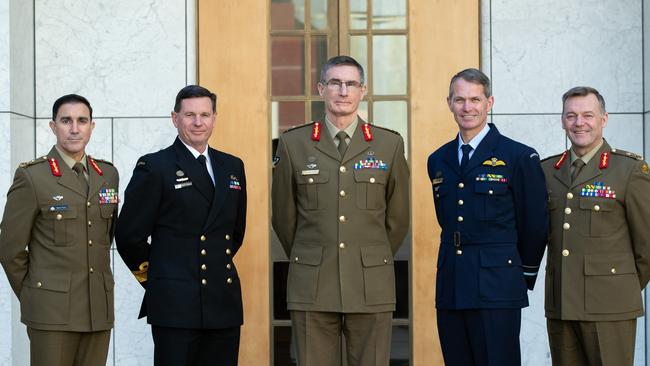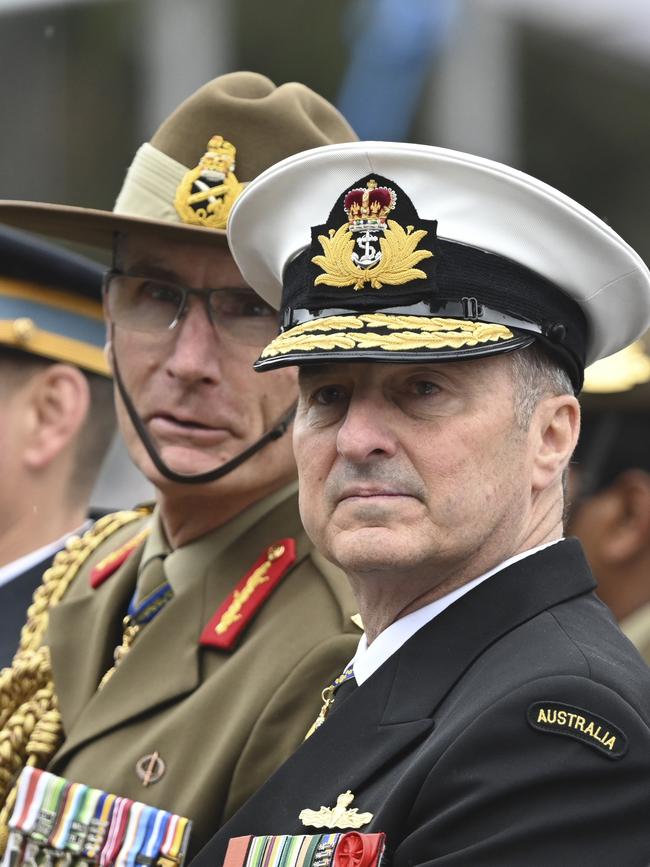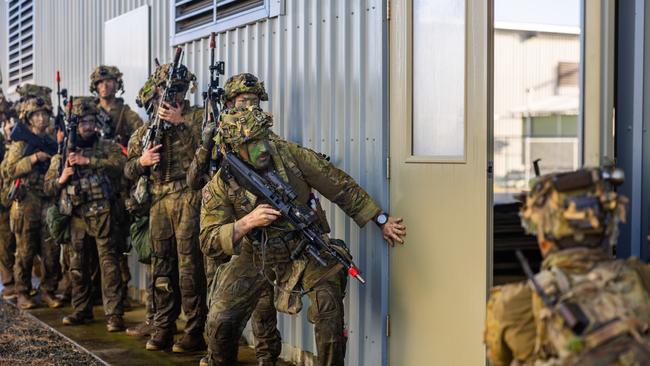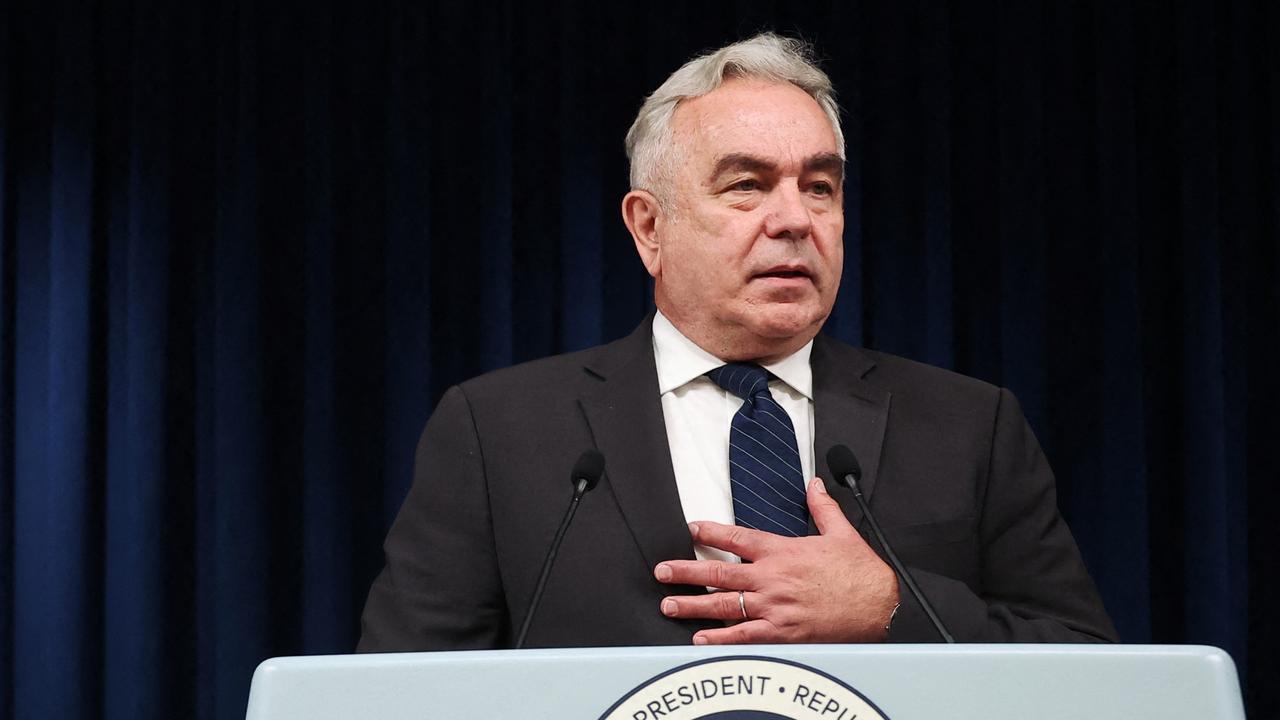Defence chiefs fail the leadership test as troop morale plunges further
Defence personnel are losing faith in their senior leaders, with fewer than a third of soldiers and sailors now rating their commanders as effective.

Defence personnel are losing faith in their senior leaders, with fewer than a third of soldiers and sailors now rating their commanders as effective, new survey data shows.
The 2024 “workplace experience” poll also reveals that despite years of effort to improve Defence’s culture, 37 per cent of personnel say they have experienced “unacceptable behaviour” in the past 12 months, including sexual misconduct and bullying.
The findings come as Defence faces a workforce crisis that has forced the government to spend $1bn on bonuses to stop its people leaving, and ask Pacific countries to allow their citizens to serve under the Australian flag.
The survey found just 29 per cent of army and 32 per cent of navy personnel felt their senior leaders were effective, down from 34 per cent and 42 per cent just three years ago.
Air force personnel were more satisfied with their higher-ups, with 37 per cent having a positive opinion of their commanders – a four-point drop since 2021.
The poll shows thousands of Australian Defence Force personnel continue to face inappropriate sexual conduct, as well as mental and physical abuse.
Across the uniformed and public service workforce, 7 per cent of women said they were victims of sexual misconduct, which the survey defines as “all potentially inappropriate sexualised behaviours experienced by survey respondents”, while 3 per cent said they had been sexually harassed.
Of both male and female respondents, 18 per cent said they had been bullied; 6 per cent said they had been discriminated against; 9 per cent said they had been the victim of an “abuse of power”. The survey found 19 per cent of ADF personnel faced a “high” or “very high” risk to their “psychological safety”; the risk was even higher for Defence public servants, at 29 per cent.

The workplace poll was conducted in April, before the departure of former Defence chief Angus Campbell and Admiral David Johnston’s commencement as his replacement.
Greens senator David Shoebridge, who got the survey findings through Senate estimates, said Defence morale was plagued by weak leadership and “deep cultural issues”.
“People who have committed to serve in the ADF see these repeated failures in leadership and then see them get promoted. Of course this breeds scepticism,” he said. “Defence leadership continues to fail to meet recruitment targets and their answer is to come to the government for more cash and fresh outsourcing of recruitment.
“You would only come up with those answers if you first buried this data.”
Australian Strategic Policy Institute analyst Euan Graham said declining satisfaction among Defence personnel in senior leaders showed there was “clearly something wrong at a systemic level”.
“Defence leaders always say ‘Our people are our most valuable resource’. So it’s clearly a worry when their best resource doesn’t have faith in them,” he said.
“Too often we focus on recapitalisation of Defence equipment but that’s all for nothing if you can’t lift the morale of the people who operate that equipment.”

Defence Minister Richard Marles said the survey results showed there was still “work to be done” to make the ADF a “first choice” employer. “As the ADF transitions to an integrated, focused force … (its) culture must continue to evolve,” he said.
The government slashed its 2024-25 workforce forecasts by nearly 5000 personnel earlier this month as recruiting and retention efforts fall short of targets.
Its workforce plan includes a further $600m to pay $40,000 retention bonuses to ADF personnel to sign on for another three years, following a $400m pilot program that barely raised the size of the ADF workforce.
Poor recruiting in Australia has forced the government to look to foreigners to bolster ADF ranks. New Zealanders living in Australia can now apply to serve in the ADF, with eligibility to be extended from January 1 to Americans, British and Canadian applicants, and later to Pacific Islander recruits.
Anthony Albanese asked Papua New Guinean counterpart James Marape in April to allow his people to serve in the ADF, but PNG is wary of rules requiring foreign recruits to take out Australian citizenship.
PNG Foreign Minister Justin Tkatchenko said the country was keen for its people to participate in the recruitment plan but wanted to ensure that they returned home after their service to contribute to the nation’s development.



